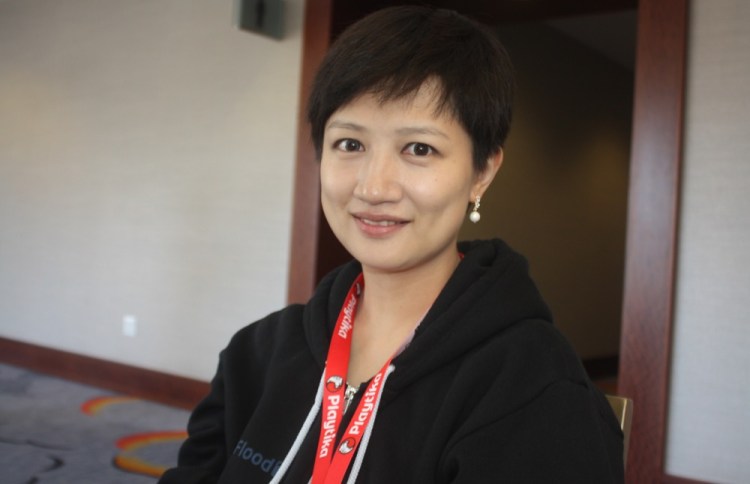PapayaMobile has gone through a few different pivots during its history. But Si Shen, the chief executive of the Beijing-based company, believes she has a winning business with AppFlood.
The company created AppFlood as a developer cross-promotion network about 18 months ago. It evolved into an ad network with more transparency for both the developers and advertisers than other services.
AppFlood makes it easier to create targeted and branded ads in an efficient and automated fashion for Chinese mobile game developers and publishers. It enables Western developers to find a market for their games in China, and it is increasingly helping Chinese game companies find users abroad.
In real-time bidding, advertisers pitch in real-time auctions for the right to show ads in front of targeted users in the time that it takes a web page to load. Ad networks and supply-side platforms make these auctions happen. A mobile-focused ad exchange is a digital market that lets advertisers and publishers buy and sell advertising space, often through real-time auctions. Shen talked about this strategy and what it means as Chinese game makers move to the global stage.
I caught up with Shen at the recent Casual Connect conference in San Francisco. Here’s an edited transcript of our talk.
GamesBeat: How is your new business working? Is it going well?
Si Shen: It’s gone very well. In the past three quarters our revenue grew 10 times. All the Chinese companies are going abroad, and we’re probably their best choice to help them get users outside China. They’re moving into the U.S., and western Europe as well. But they also focus on developing countries in places like the middle east.
GamesBeat: It sounded like the Middle East, for you, is a bigger market than North America.
Shen: In terms of ad spending from China, it’s the largest for AppFlood. But it’s a little bit skewed. The data are more China-centric, but we work with a lot of partners outside of China, and they’ve told us that the ad spend from China has grown enormously in the past several quarters.
GamesBeat: Does that have something to do with — is there not as much direct spending on games, through things like in-app purchases, in China? Are ads a better way to monetize? In the U.S., it’s always been the opposite.
Shen: Chinese companies see ads as the only way to acquire users outside of China. Game companies might care about ROI and monetization, but for the app companies, they don’t care as much. Their applications aren’t monetizable in that way. They see this as an investment opportunity. If they don’t go to those markets right now, they’ll lose those markets.
GamesBeat: Do you see this as something that could have endless growth, or is it more temporary?
Shen: For the next two or three years, at least, this is just going to grow. I’ve seen the budget from one of our clients, which is one of the largest internet companies in China. They’ve doubled their budget on this every quarter – 2 million, 5 million, 10 million, 20 million.
GamesBeat: If there are cases where people aren’t making the most of an opportunity, where would that be? And the flip side would be, what’s the best opportunity to go after?
Shen: Some people have traffic that’s not monetized very well yet. We run the realtime bidding business, so we work with some supply-side providers. Sometimes they have traffic in developing countries that they just don’t monetize. They don’t know where to find good advertisers.
We see a transparency problem in the information flow. A lot of people are spending a lot of money trying to find this traffic, while a lot of other people have this traffic and don’t know what to do with it.
GamesBeat: Are there countries you’d think of in particular there, nations that are underserved?
Shen: Indonesia is becoming big. So is Brazil. And the middle eastern countries in general.
GamesBeat: Are they also countries that some companies have avoided just because they don’t think there’s a game market there? Indonesia doesn’t usually come up that high on the list.
Shen: For games, definitely, they care more about Thailand and other southeast Asian countries. Recently, a lot of our advertisers have been looking for Russian users.
GamesBeat: Do you see geopolitics affecting your business? We have a conflict in Israel and a possible war in Ukraine. It’s a global business, and it seems like that kind of thing affects it.
Shen: Definitely. I remember a saying – if the economy is on the way down, people usually spend more time playing games. There’s probably a similar effect related to political situations. If the political situation is unstable, people may be spending more time on their mobile phones.
GamesBeat: What’s your competition like? Do you see a lot of competitors, or is the space you’re in less crowded?
Shen: In our specific space, we’re at a spot where we don’t have a lot of competitors. But it’s a huge market.
GamesBeat: Could you run down the two case studies you recently presented?
Shen: One is a game, the other is a non-game application. For the game, they have a very specific ROI goal. We suggested that they target global users through their trial, to see which regions might have the highest ROI, but with a very low CPI. They were able to optimize the traffic they get through us and see a good return.
For the non-game app, they just want to grab a foothold at this point. They don’t care where users are from, so long as they get a huge volume of users. As long as the CPI is lower, in that case, than 25 cents, and the retention rate is relatively acceptable, they’ll do it.



